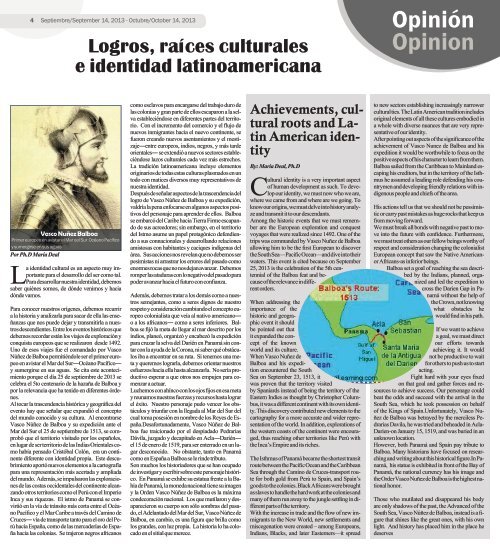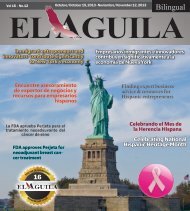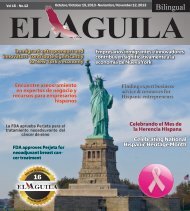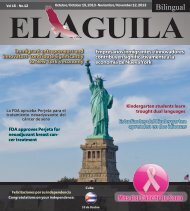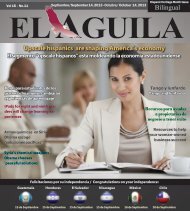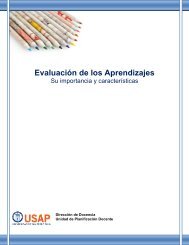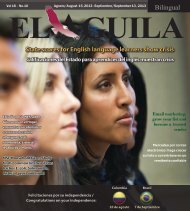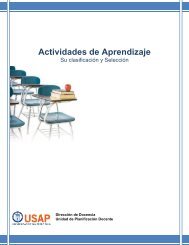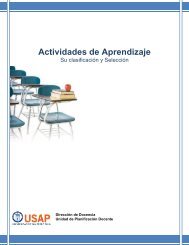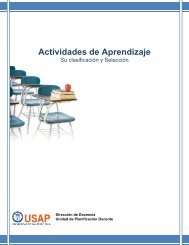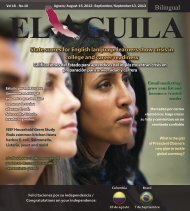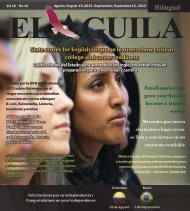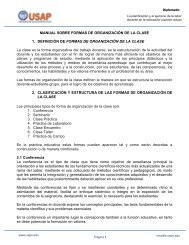You also want an ePaper? Increase the reach of your titles
YUMPU automatically turns print PDFs into web optimized ePapers that Google loves.
EL <strong>AGUILA</strong><br />
4 Septiembre/September 14, 2013 - Octubre/October 14, 2013<br />
Vasco Nuñez Balboa<br />
Primer europeo en avistar el Mar del Sur Océano Pacífico<br />
y sumergirse en sus aguas<br />
Por Ph.D María Deal<br />
La identidad cultural es un aspecto muy importante<br />
para el desarrollo del ser como tal.<br />
Para desarrollar nuestra identidad, debemos<br />
saber quiénes somos, de dónde venimos y hacia<br />
dónde vamos.<br />
Para conocer nuestros orígenes, debemos recurrir<br />
a la historia y analizarla para sacar de ella las enseñanzas<br />
que nos puede dejar y transmitirla a nuestros<br />
descendientes. Entre los eventos históricos que<br />
debemos recordar están los viajes de exploración y<br />
conquista europeos que se realizaron desde 1492.<br />
Uno de esos viajes fue el comandado por Vasco<br />
Núñez de Balboa permitiéndole ser el primer europeo<br />
en avistar el Mar del Sur―Océano Pacífico―<br />
y sumergirse en sus aguas. Se cita este acontecimiento<br />
porque el día 25 de septiembre de 2013 se<br />
celebra el 5to centenario de la hazaña de Balboa y<br />
por la relevancia que ha tenido en diferentes órdenes.<br />
Al tocar la trascendencia histórica y geográfica del<br />
evento hay que señalar que expandió el concepto<br />
del mundo conocido y su cultura. Al encontrarse<br />
Vasco Núñez de Balboa y su expedición ante el<br />
Mar del Sur el 25 de septiembre de 1513, se comprobó<br />
que el territorio visitado por los españoles,<br />
en lugar de ser territorio de las Indias Orientales como<br />
había pensado Cristóbal Colón, era un continente<br />
diferente con identidad propia. Este descubrimiento<br />
aportó nuevos elementos a la cartografía<br />
para una representación más acertada y ampliada<br />
del mundo. Además, se impulsaron las exploraciones<br />
de las costas occidentales del continente alcanzando<br />
otros territorios como el Perú con el Imperio<br />
Inca y sus riquezas. El istmo de Panamá se convirtió<br />
en la vía de tránsito más corta entre el Océano<br />
Pacífico y el Mar Caribe a través del Camino de<br />
Cruces― vía de transporte tanto para el oro del Perú<br />
hacia España, como de las mercaderías de España<br />
hacia las colonias. Se trajeron negros africanos<br />
Logros, raíces culturales<br />
e identidad latinoamericana<br />
como esclavos para encargarse del trabajo duro de<br />
las colonias y gran parte de ellos escaparon a la selva<br />
estableciéndose en diferentes partes del territorio.<br />
Con el incremento del comercio y el flujo de<br />
nuevos inmigrantes hacia el nuevo continente, se<br />
fueron creando nuevos asentamientos y el mestizaje―entre<br />
europeos, indios, negros, y más tarde<br />
orientales― se extendió a nuevos sectores estableciéndose<br />
lazos culturales cada vez más estrechos.<br />
La tradición latinoamericana incluye elementos<br />
originarios de todas estas culturas plasmados en un<br />
todo con matices diversos muy representativos de<br />
nuestra identidad.<br />
Después de señalar aspectos de la trascendencia del<br />
logro de Vasco Núñez de Balboa y su expedición,<br />
valdría la pena enfocarse en algunos aspectos positivos<br />
del personaje para aprender de ellos. Balboa<br />
se embarcó del Caribe hacia Tierra Firme escapando<br />
de sus acreedores; sin embargo, en el territorio<br />
del Istmo asume un papel protagónico defendiendo<br />
a sus connacionales y desarrollando relaciones<br />
amistosas con habitantes y caciques indígenas del<br />
área. Sus acciones nos revelan que no debemos ser<br />
pesimistas ni arrastrar los errores del pasado como<br />
enormes rocas que no nos dejan avanzar. Debemos<br />
romper las ataduras con lo negativo del pasado para<br />
poder avanzar hacia el futuro con confianza.<br />
Además, debemos tratar a los demás como a nuestros<br />
semejantes, como a seres dignos de nuestro<br />
respeto y consideración cambiando el concepto europeo<br />
colonialista que veía al nativo americano―<br />
o a los africanos― como a seres inferiores. Balboa<br />
se fijó la meta de llegar al mar descrito por los<br />
indios, planeó, organizó y encabezó la expedición<br />
para cruzar la selva del Darién en Panamá sin contar<br />
con la ayuda de la Corona, ni saber qué obstáculos<br />
iba a encontrar en su ruta. Si tenemos una meta<br />
y queremos lograrla, debemos orientar nuestros<br />
esfuerzos hacia ella hasta alcanzarla. No sería productivo<br />
esperar a que otros nos empujen para comenzar<br />
a actuar.<br />
Luchemos con ahínco con los ojos fijos en esa meta<br />
y reunamos nuestras fuerzas y recursos hasta lograr<br />
el éxito. Nuestro personaje pudo vencer los obstáculos<br />
y triunfar con la llegada al Mar del Sur del<br />
cual toma posesión en nombre de los Reyes de España.Desafortunadamente,<br />
Vasco Núñez de Balboa<br />
fue traicionado por el despiadado Pedrarias<br />
Dávila, juzgado y decapitado en Acla―Darién―<br />
el 15 de enero de 1519, para ser enterrado en un lugar<br />
desconocido. No obstante, tanto en Panamá<br />
como en España a Balboa se le rinde tributo.<br />
Son muchos los historiadores que se han ocupado<br />
de investigar y escribir sobre este personaje histórico.<br />
En Panamá se exhibe su estatua frente a la Bahía<br />
de Panamá, la moneda nacional tiene su imagen<br />
y la Orden Vasco Núñez de Balboa es la máxima<br />
condecoración nacional. Los que mutilaron y desaparecieron<br />
su cuerpo son sólo sombras del pasado,<br />
el Adelantado del Mar del Sur, Vasco Núñez de<br />
Balboa, en cambio, es una figura que brilla como<br />
los grandes, con luz propia. La historia lo ha colocado<br />
en el sitial que merece.<br />
Achievements, cultural<br />
roots and Latin<br />
American identity<br />
By: Maria Deal, Ph.D<br />
Cultural identity is a very important aspect<br />
of human development as such. To develop<br />
our identity, we must now who we are,<br />
where we came from and where are we going. To<br />
know our origins, we must delve into history analyze<br />
and transmit it to our descendants.<br />
Among the historic events that we must remember<br />
are the European exploration and conquest<br />
voyages that were realized since 1492. One of the<br />
trips was commanded by Vasco Nuñez de Balboa<br />
allowing him to be the first European to discover<br />
the South Sea—Pacific Ocean—and dive into their<br />
waters. This event is cited because on September<br />
25, 2013 is the celebration of the 5th centennial<br />
of the Balboa feat and because<br />
of the relevance in different<br />
orders.<br />
When addressing the<br />
importance of the<br />
historic and geographic<br />
event it should<br />
be pointed out that<br />
it expanded the concept<br />
of the known<br />
world and its culture.<br />
When Vasco Nuñez de<br />
Balboa and his expedition<br />
encountered the South<br />
Sea on September 23, 1513, it<br />
was proven that the territory visited<br />
by Spaniards instead of being the territory of the<br />
Eastern Indies as thought by Christopher Columbus,<br />
it was a different continent with its own identity.<br />
This discovery contributed new elements to the<br />
cartography for a more accurate and wider representation<br />
of the world. In addition, explorations of<br />
the western coasts of the continent were encouraged,<br />
thus reaching other territories like Perú with<br />
the Inca’s Empire and its riches.<br />
The Isthmus of Panamá became the shortest transit<br />
route between the Pacific Ocean and the Caribbean<br />
Sea through the Camino de Cruces-transport route<br />
for both gold from Perú to Spain, and Spain’s<br />
goods to the colonies. Black Africans were brought<br />
as slaves to handle the hard work at the colonies and<br />
many of them run away to the jungle settling in different<br />
parts of the territory.<br />
With the increase in trade and the flow of new immigrants<br />
to the New World, new settlements and<br />
miscegenation were created – among Europeans,<br />
Indians, Blacks, and later Easterners—it spread<br />
Opinión<br />
Opinion<br />
to new sectors establishing increasingly narrower<br />
cultural ties. The Latin American tradition includes<br />
original elements of all these cultures embodied in<br />
a whole with diverse nuances that are very representative<br />
of our identity.<br />
After pointing out aspects of the significance of the<br />
achievement of Vasco Nunez de Balboa and his<br />
expedition it would be worthwhile to focus on the<br />
positive aspects of his character to learn from them.<br />
Balboa sailed from the Caribbean to Mainland escaping<br />
his creditors, but in the territory of the Isthmus<br />
he assumed a leading role defending his countrymen<br />
and developing friendly relations with indigenous<br />
people and chiefs of the area.<br />
His actions tell us that we should not be pessimistic<br />
or carry past mistakes as huge rocks that keep us<br />
from moving forward.<br />
We must break all bonds with negative past to move<br />
into the future with confidence. Furthermore,<br />
we must treat others as our fellow beings worthy of<br />
respect and consideration changing the colonialist<br />
European concept that saw the Native Americanor<br />
Africans-as inferior beings.<br />
Balboa set a goal of reaching the sea described<br />
by the Indians, planned, organized<br />
and led the expedition to<br />
cross the Darien Gap in Panamá<br />
without the help of<br />
the Crown, not knowing<br />
what obstacles he<br />
would find in his path.<br />
If we want to achieve<br />
a goal, we must direct<br />
our efforts towards<br />
achieving it. It would<br />
not be productive to wait<br />
for others to push us to start<br />
acting.<br />
Fight hard with your eyes fixed<br />
on that goal and gather forces and resources<br />
to achieve success. Our personage could<br />
beat the odds and succeed with the arrival in the<br />
South Sea, which he took possession on behalf<br />
of the Kings of Spain.Unfortunately, Vasco Nuñez<br />
de Balboa was betrayed by the merciless Pedrarias<br />
Davila, he was tried and beheaded in Acla-<br />
Darien-on January 15, 1519, and was buried in an<br />
unknown location.<br />
However, both Panamá and Spain pay tribute to<br />
Balboa. Many historians have focused on researching<br />
and writing about this historical figure.In Panamá,<br />
his statue is exhibited in front of the Bay of<br />
Panamá, the national currency has his image and<br />
the Order Vasco Nuñez de Balboa is the highest national<br />
honor.<br />
Those who mutilated and disappeared his body<br />
are only shadows of the past, the Advanced of the<br />
South Sea, Vasco Núñez de Balboa, instead is a figure<br />
that shines like the great ones, with his own<br />
light. And history has placed him in the place he<br />
deserves


